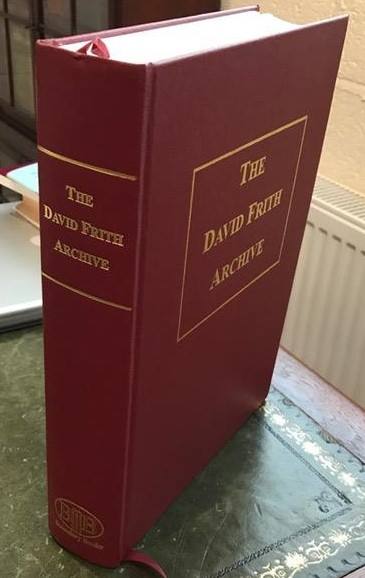The incredible volume …
A 1073-page tome. Compiled over 6000 hours by David Frith to catalogue his own incredible collection. Mayukh Ghosh tells us the story behind this extraordinary book.
" I am fortunate in being able at any time to pluck any of cricket's many engrossing books from the shelves, from among seventy or so categories, and dip into them for an hour or for half the day.
”Letters can be read, written by Jack Hobbs and W.G. Grace and Don Bradman and two thousand and more other cricket people.
“I can listen to the voice of a man who played in the very first Test match, in 1877, or to Harold Larwood justifying Bodyline ( with Frank Foster expressing his indignation on the reverse of this fragile old shellac recording), or to John Arlott's commentary in the halcyon 1948 summer, or, if I feel like a laugh, the tapes with Jeff Thomson as we tried to find enough substance for a book.
“Whenever I browse through the piles of scrapbook the amount of rich content that I'd forgotten surprises me.
“And the autographs retain their thrill, many gathered when I was a boy, thousands more acquired subsequently.
As for the files, the range is very broad, including some of the most turbulent events in my working life in cricket.
“The sheer mass of material astonishes me by its volume.
“How can so many postcards and postage stamps and cigarette cards have accumulated?
“Flicking through the menus revives visions of dinners memorable for good company and fine speeches (as well as many of the other kind too)."
In January 1951, David Frith bought a tour programme on his first day at a Test match, at the Sydney Cricket Ground.
E.W. Swanton’s book on that series soon followed it to his bookshelf and then J.M. Kilburn’s little book on Len Hutton.
Soon, he exposed himself to Cardus’ cricket writing and an autobiography of his idol Ray Lindwall.
Affording all that was always an issue; he had a family to look after. Moreover, back in those days, no one collected because it was, in Sigmund Freud’s words, some sort of ‘compensation for loss’.
But, for a man who wrote about Jim Laker’s 19-90 in what was supposed to be a love letter, all these were minor obstacles.
In 1966, he attended an auction at Hodgson’s saleroom.
He watched in dismay as the eleven volumes of Brichter’s Scores fetched £350, a figure which he was then earning in four months.
But he came back and wrote to the great collector Joe Goldman.
And thus started his regular pilgrimages to Goldman’s cottage.
Goldman’s wife once said that she’d give away all of her husband’s collections (after his death) to three of his proteges: Tony Baer, Irving Rosenwater and David Frith!
It didn’t happen but the seeds were already sown. Frith has actively collected over the last fifty-odd years and has built a home-cum-museum worth visiting for any cricket aficionado.
The idea of the Archive didn’t occur to Frith one fine day. He had too often faced this question: “What’s going to happen to all this?”
He thought that the first step would be to at least make a detailed catalogue of what he possesses.
In 1999, The Trailblazers was published. It was about the foundation of cricket between England and Australia.
The publisher, Michael Down at Boundary Books, was happy with the result, and when Frith, the author, shared this idea of a detailed catalogue with him, Down instantly agreed to publish it.
Frith then started to work on it. It took him a staggering six thousand hours to prepare the catalogue!
Then, on March 17th 2009, on the occasion of the author's mother's centenary of birth, The David Frith Archive was published.
A 1073-page tome. 75 numbered and signed copies. Each of the first 15 accompanied by a DVD covering the archive in digital form.
He has, since then, maintained a file documenting the additions. As of now, it is another 86 pages.
He still buys the odd letter and memorabilia.
He will, perhaps, continue to do so till his last breath.
From the archives
Anyone interested to buy the DF Archive can contact the publisher at www.boundarybooks.com
When I last checked, they did have one of the first 15 copies, priced at £550.


